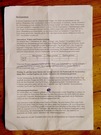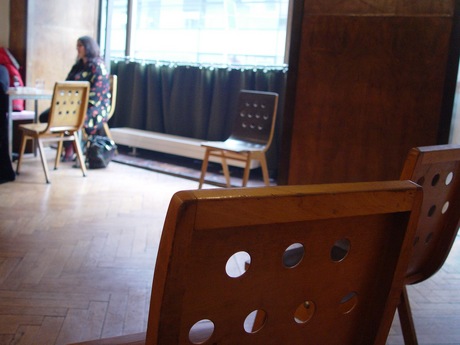Von Neumann's Play Off
Already two weaks ago now I had the opportunity to participate in an experiment of a 'different' kind: basically part of an effort to research 'voting' as a deciding mechanism in an self-administered funding-system for the viennese netculture, "Von Neumann's Play Off" (named after the mathematician John von Neumann) maybe revealed some sources for our so-called social behaviour as a consequence of our personal striving for an economic advantage.

Unlike a usual voting-situation the experiment was held in small groups of 5 people. The setup was simple:
The 5 groupmembers there were divided in 3 of type 'M' and 2 of type 'N'. All together had to vote on unspecified "issues" (it was not important what these issues meant). The voting happened by ranking preferred options (marked by 'beta', 'omega' and 'gamma'). The difference between 'M' and 'N' consisted in the different value these options had for them. While i.e. 'beta' meant 10 points for 'M' it meant only 3 for 'N'. This all would not have had much influence on the outcome if there wouldn't have been the opportunity of communication within the participants, which was only possible within eqal types ('N' <>'N', 'M'<>'M', not 'N'<>'M'). Obviously this made it easy for 'M' to gain the maximum out of every vote whereas 'N' could be held in second place. Too obvious how to 'win' this game (at least for the 'M's ...). 
Nevertheless a second, closer look at the game-arthmetics revealed, that the 'winner's logic' is also somewhat contradictory to a logic that has the maximum possible common in focus. For example: the 'M' would certainly always prefer to rank 'beta' in first place. This nearly guarantees 'Beta' will win. Naturally the 'N's prefer 'Omega', but they need help by at least 2 'M's who rank 'Omega' in second place in order to save the chance of winning the round.
But there is crucial difference between those two scenarios: while 'Beta' as the winning option would yield 10 points (or Euros or Dollars or whatever currency) for each 'M' and only 3 Euros for each 'N', which makes 36 points (or Euros or Dollars or whatever) for all 5 participants, option 'Omega' yields 44 points for all together. Which solution would be there favorible one in terms of common welfare? We can probably assume that a sitution like this will never (or very rarely) happen in real life. With a growing number of participants not only the chances of forming alliances will become more difficult but also the weighing common welfare against maximum personal gain won't be so clearly differntiable, which normally allowes us to vote with clean conscience (...). Nevertheless belief in 'democratic fairness' seems shattered by the realisation of the economic character of voting in specific and our actions in general.

At first glance the experiment seemed to have clearly demonstrated the power and necessity of alliance-building. How else would one be able to get out of this as a 'winner'?
Looking a bit closer and questioning my own motivation (and its changes during the voting itself) revealed a slightly more altruistic approach: Asked for their strategies, not all of the participants had voted solely in favor of what one could assume was ones personal advantage. Well, reasonably the 'M's tended a little more towards an altruistic vote. But even within the 'M's, as I was within them, at first voted in way that left them at least a maximum of chances (both groups could get a maximum of points, which would have meant the winner got drawn by chance). 
A few weeks ago I accidently heard a feature story about John von Neumann. Basically a mathemtician he not set standards in computer science but his ideas had consequences in mordern economics and poliitics. I do not want this to understood as a statement for or against the ideas of J. v. N. (I'm definitly no academic mathematician) ... to be continued
|







